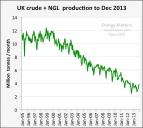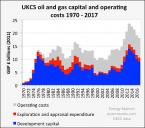
-
Observed decline rate of the 1,600 fields that provide 70% of the world’s oil today and that are post-‐peak, you have an observed decline rate of 6.2%.
More broad view. If you look all of the fields currently producing conventional crude oil today, they produce about 69 million barrels of oil and that with ongoing investment in those fields over time that is natural, you would get to 28 million barrels by 2035.
If you look at the raw numbers, global upstream capex for the oil and gas industry - and about 75% of the total is just for oil -‐ has trebled in real terms since 2000. The IEA estimates that upstream capex this year will be about $700 billion compared with $250 billion in 2000 in real terms. Those numbers are in constant dollars. So that is a real term increase of nearly three times.
US, of course, is most efficient, as mass media will tell you.
OECD in North America is producing about 20% of the world’s oil at the moment but OECD in North America accounts for 50% of the world’s capex for oil.
Sorry, they again lied to you. Some independent estimates show that for each $1 invested US gets shale oil worth 10 cents.
http://www.jeremyleggett.net/wp-content/uploads/2014/01/131210-TESD-Part-One-edited-transcript.pdf
-
Small illustration in example of UK to show that US is not alone:



As you can see big investments can't even hold declines.

 oil.jpg500 x 449 - 37K
oil.jpg500 x 449 - 37K
 oil1.jpg506 x 450 - 45K
oil1.jpg506 x 450 - 45K
 oil2.jpg505 x 447 - 41K
oil2.jpg505 x 447 - 41K -
http://peakoilbarrel.com/ <--- another good site to track up_to_date production numbers.. The owner is a retired Nasa tech that monitors and charts all data he comes across
-
After nearly 50 years of production, Britain’s oil sector has reached a crucial point. To put it bluntly, Britain’s offshore oil industry has entered old age. The size of discoveries has tailed off sharply, a classic sign of maturity. Production has fallen 37 percent from 2010 levels, while costs, thanks in part to the need to maintain creaky infrastructure, have soared. All of this adds up to sharply reduced profitability of the oil and gas fields, to a point where some of them lose money. Executives say that unless the British government and energy companies adjust to the new realities, the industry could find itself in deep trouble.
http://www.nytimes.com/2014/10/30/business/energy-environment/britain-oil-and-gas.html?_r=0
Howdy, Stranger!
It looks like you're new here. If you want to get involved, click one of these buttons!
Categories
- Topics List23,984
- Blog5,725
- General and News1,352
- Hacks and Patches1,153
- ↳ Top Settings33
- ↳ Beginners255
- ↳ Archives402
- ↳ Hacks News and Development56
- Cameras2,365
- ↳ Panasonic991
- ↳ Canon118
- ↳ Sony156
- ↳ Nikon96
- ↳ Pentax and Samsung70
- ↳ Olympus and Fujifilm100
- ↳ Compacts and Camcorders300
- ↳ Smartphones for video97
- ↳ Pro Video Cameras191
- ↳ BlackMagic and other raw cameras119
- Skill1,961
- ↳ Business and distribution66
- ↳ Preparation, scripts and legal38
- ↳ Art149
- ↳ Import, Convert, Exporting291
- ↳ Editors191
- ↳ Effects and stunts115
- ↳ Color grading197
- ↳ Sound and Music280
- ↳ Lighting96
- ↳ Software and storage tips267
- Gear5,416
- ↳ Filters, Adapters, Matte boxes344
- ↳ Lenses1,579
- ↳ Follow focus and gears93
- ↳ Sound498
- ↳ Lighting gear314
- ↳ Camera movement230
- ↳ Gimbals and copters302
- ↳ Rigs and related stuff273
- ↳ Power solutions83
- ↳ Monitors and viewfinders340
- ↳ Tripods and fluid heads139
- ↳ Storage286
- ↳ Computers and studio gear560
- ↳ VR and 3D248
- Showcase1,859
- Marketplace2,834
- Offtopic1,319




